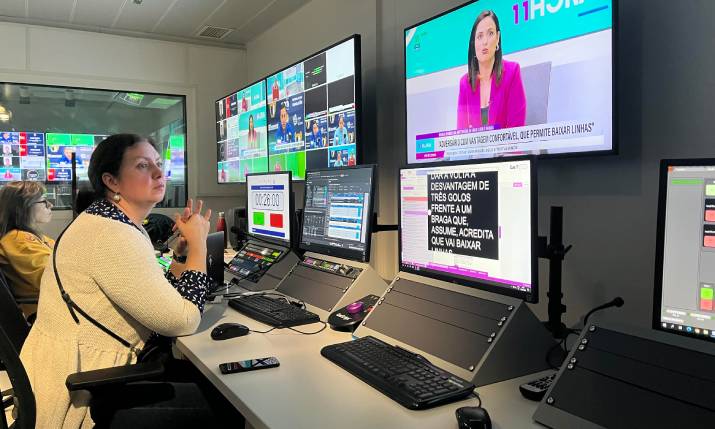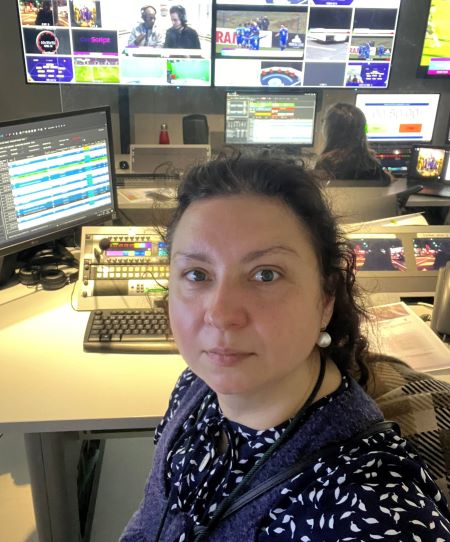Survivor: Ukrainian producer and sports journalist Yaroslava Shumyk on her career, escaping from war and building a new life in Portugal

Yaroslava Shumyk is a Ukrainian producer at pay-TV channel Canal 11, which is owned and operated by the Portuguese Football Federation
“During the last two years my role has changed from being a breastfeeding mom on maternity leave during the pandemic with two babies, to running from a war, to producer at a Portuguese TV channel. It all still feels unreal,” reminisces Yaroslava Shumyk, a producer at pay-TV channel Canal 11, which is owned and operated by the Portuguese Football Federation.
When Shumyk was offered her current role at Canal 11 by the Portuguese Football Federation, she was in Poland with her young children, having fled the war in her homeland of Ukraine just weeks previously.
“Now, I would say that nothing was a challenge before the war came into my life. To find a job and keep it on the high standard level that I was used to when you have kids two and three years old, in a new country, with a new language, new ev-ry-th-ing. This is a challenge. But I’m fighting”
Her friends from around the world in sports broadcasting stepped up to help her find work as well as somewhere safe to live, while her partner remained in Ukraine.
Yet while her situation made the job offer a lifesaver, it also appealed to her professionally. She says: “[I took the job because] I have experience in TV production and, even without knowledge of Portuguese, I knew I could survive because I know how TV works.”
No words
It was challenging for several reasons, however. “There were two hardest things,” Shumyk says. “The new language, and my mental state because of the war. All the rest was just the new information that is normal for a new workplace.”
Learning the language was a huge step in making her feel more comfortable, states Shumyk. “To take a first phone call and reply in Portuguese was both a challenge and an achievement. I was scared like a child to speak on the phone, because I didn’t want to make excuses that I´m refugee, that I´m only learning the language; I thought this would be not professional. So, at first I spoke via online messengers mostly, then one day I took the phone and was surprised that I understood everything I was told; it was about problem with electricity on site at the stadium. That was the day that I stopped fearing my work phone, and I started to speak Portuguese – with mistakes! – but I tried to make it short and clear, just to receive the result.
“Now I enjoy understanding what is going on around me, what people are talking about, making some jokes, because for the first few months it was just a noise; I didn’t understand a word, which made me feel very bad.
“With my knowledge of Portuguese now I can learn more about local TV specifics, expand my contacts, and prove every day that I’m professional. I was always in love working on live TV as a journalist, but I do like it here behind the screen; this is still my favourite part of the job.”

Shumyk worked for many years on news programming as a sports journalist on the Ukrainian STB commercial TV channel (СТБ in Ukrainian)
Paling into insignificance
When asked what challenges she has faced in her career, Shumyk notes that compared to what she has had to live through in the last 12 months, everything has paled into insignificance. “Now, I would say that nothing was a challenge before the war came into my life. To find a job and keep it on the high standard level that I was used to when you have kids two and three years old, in a new country, with a new language, new ev-ry-th-ing. This is a challenge. But I’m fighting.”
“I love the feeling when the team can catch the moment, catch the emotion, catch the story, and tell it via broadcasting just now. This is incredible, and this is what live broadcasting is about; catching a moment that might stay in the history”
Yet she adds on working in live sport today that, “I think, the most challenging thing is keeping a work-life balance”. She continues: “To learn how to do time management to raise kids and to stay on a high professional level when you didn’t sleep normally for years is hard. But, if not speaking about my private life, I would say that mental health and knowledge of how to defend it is mandatory under the high pressure of live broadcasting nowadays.”
Catching the emotion
Shumyk has worked on news programming as a sports journalist on the Ukrainian STB commercial TV channel (СТБ in Ukrainian), where she started out at the age of 19 following the completion of her Masters Degree in Journalism, “and I fell in love with TV magic”, she says.
“Nevertheless, I was never thinking of myself as being on TV, as I was concerned about being non-attractive,” she continues. “But, when I went to my first event with a cameraman, I forgot about everything. I just liked the process.
“One great thing about that first job was interviewing the band, Scorpions. I was the only available journalist on that day who was able to speak English. I was sent to speak with Klaus Meine from the band for up to 10 minutes exclusively. It was speechless experience when you are 19 and can communicate directly with a star.”
She continues: “I was always interested in international events. The first global tournament I worked on was the Beijing Olympics, and since then I’ve been to London and the Rio Olympics covering the Games for Ukrainian TV channel 1+1 as a TV journalist.
“I love the feeling when the team can catch the moment, catch the emotion, catch the story, and tell it via broadcasting just now. This is incredible, and this is what live broadcasting is about; catching a moment that might stay in the history.”
Since then she has been able to work on a series of big sports productions. “As of 2011 I was involved in TV production as production manager at the Champions and Europa League matches, working with visiting broadcasters. As of 2015 I cooperated with the beIn Sports channel as production manager at the UEFA Champions League (UCL) matches in Ukraine and Belarus. In 2018 I worked with ESPN Latino for the UCL final in Kyiv as television production manager. And as of April 2022 I work as a producer for TV channel, Canal 11 in Portugal.”
She remembers a stand-out moment of her career before the war: “The coolest moment was when I managed to work for ESPN Latino at the UEFA Champions League Final in Kyiv from… my bed. Because I was in the early months of my pregnancy and the doctor didn’t allow me to stand up at all. As I started working with ESPN Latino long before being pregnant, I couldn´t just leave them, and the ESPN producers I’d been in contact with showed 100% understanding of the situation, and we did everything like a team. I’m proud of it.”
Concluding, this strong woman gives her advice to other women out there: “Learn how to cherish the work of yours and the work of others first. Compliment your colleagues loudly, and if you need to criticise, make it only in private.”

